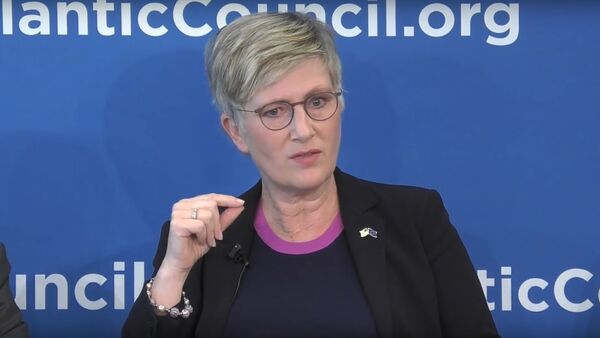The two new anti-Russian sanctions bills currently working their way through Congress have nothing to do with Europe and are the US' own internal business, Caroline Vicini, deputy head of the European Union's foreign delegation in Washington has said.
"With the sanctions that are now up on the Hill, it puts us in a very unfortunate situation in the EU, because we have to go up and lobby, and seem to look like we are standing on the Russian side, when actually we are standing on the US side. We want to contribute, but we cannot take responsibility for all kinds of actions that are happening here. The Russian interference in US elections – that is US business, how you go about it. And it's US internal politics, much more than having anything to do with Europe," the diplomat said, speaking at a conference in Washington, DC on Wednesday.
Recalling that the EU fully supported US sanctions measures against Russia in 2014, and noting that Brussels has continued to work to keep them in place, despite internal disagreements between EU members, Vicini said it was important to recall that Europe "actually took a much bigger hit than the United States" with the sanctions' economic consequences.
"The EU's trade with Russia was 1/10th of what the EU's [total] trade was. And the EU trade with Russia has fallen 50 percent since 2014. So it is a considerable hit. The US is benefiting, actually from what the EU is doing, and the EU is carrying the burden," the envoy complained.
Vicini also called for more "due diligence" from Europe's US partners, saying that the threat of US sanctions against Russian businessman Oleg Deripaska had actually "threatened to wipe out the whole aluminium sector in Europe," with that danger passing by a margin of just three votes in the Senate after Washington decided to lift the restrictions on companies linked to Deripaska.
Ultimately, the diplomat warned that she had doubts about 'sanctions fatigue' in the US following the collapse of the Russiagate narrative, saying both Congress and the Trump administration seemed to remain "in full swing when it comes to sanctions, unfortunately. Today we expect the waiver of Helmes Burton being lifted, which will hit European companies that has activities in Cuba. And it's another hit against European business for American political purposes," she said.
Congress has two new pieces of anti-Russian legislation in the pipeline, including the DETER Act and the DASKA Act, each targeting 'tough' measures including bans on operations with Russian state banks, sanctions on investment in Russian energy companies, the targeting of Russian sovereign debt, and restrictions on Russian nationals accused of cyberattacks.
The US has already slapped Russia with over two dozen packages of sanctions over the 2014 Ukraine crisis, alleged Russian meddling in the 2016 US presidential election, and the March 2018 poisoning of a former Russian spy in the UK (for which the UK and the US blamed Russia). Russia has denied claims of wrongdoing in all three instances, calling meddling claims "completely unsubstantiated" and complaining that it did not receive access to the spy poisoning investigation or diplomatic access to its citizens in the aftermath of the alleged attack.




